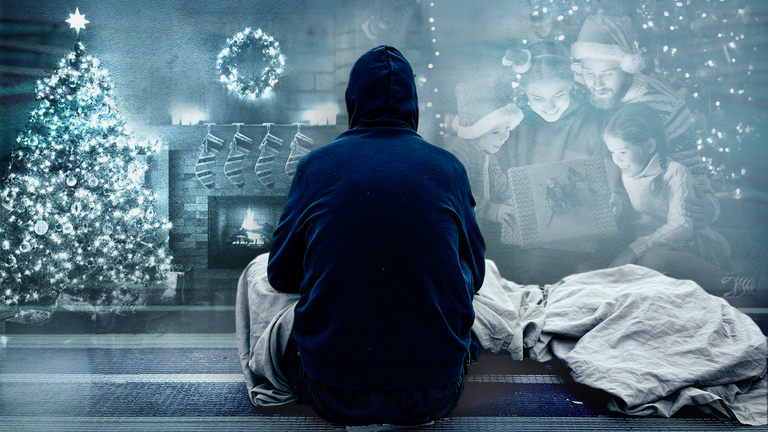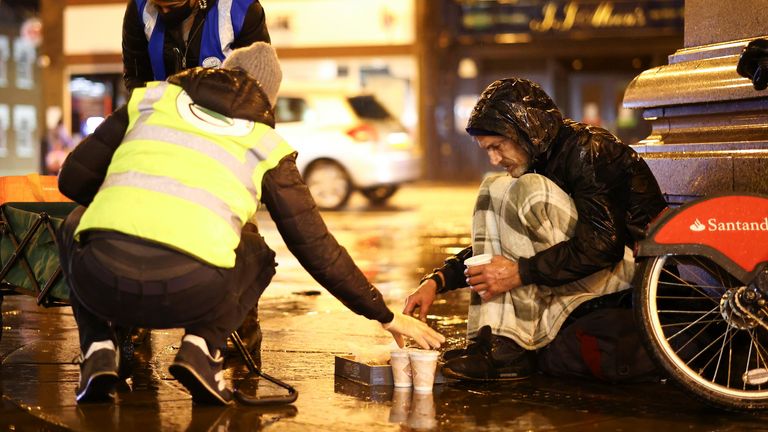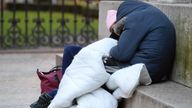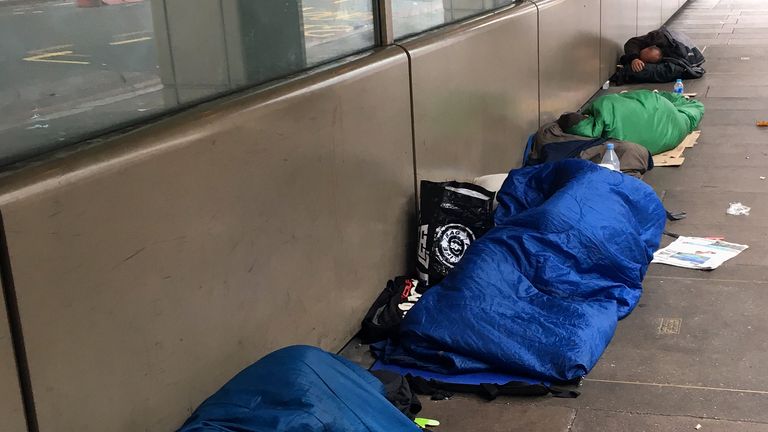There's cold comfort for the homeless this Christmas amid the economic crisis | Adam Boulton
As many people look forward to the comforts of the annual yuletide festival, they are also likely to be troubled by remembering those who have no warm hearth to welcome them this year.
Saturday 17 December 2022 02:53, UK
This winter there are three 'C's intensifying concern about the homeless: Christmas, Cold and the Cost of living.
As many look forward to the comforts of the annual yuletide festival they are also troubled by remembering those who have no warm hearth to welcome them. This is a good time to stimulate the charitable instincts of the "haves". The totemic charity Crisis, which offers year-round employment, education, housing and wellbeing services to people experiencing homelessness in the UK, began as Crisis at Christmas.
The cold snap of week-long sub-zero temperatures and snow across the country has brought home the importance of decent shelter for everyone, while Russia's war on Ukraine has made it more difficult for many to keep themselves warm because energy and heating costs are spiralling.
Expensive fuel is just one factor in rapidly rising inflation and prices. Some on low incomes and benefits face a choice between spending scarce money on heating or food, for themselves and their families. There is a third factor competing for their strained resources - the cost of keeping a roof over their heads.
Soaring costs have extended the threat of homelessness further into the population. According to official figures, 20,000 of those facing eviction in the first half of this year are from households in full-time work.
There are many types of homelessness. Most visible to the general public are rough sleepers, once notoriously referred to by a Conservative minister and baronet as "the people you step over when you come out of the opera". But needy as these people are, they do not represent the entire homeless problem as sadly it goes much deeper than that.
Statistically, far more people and families are off the streets but with no place of their own - staying in sheds, vans, B&Bs, hostels, shelters, on friends' sofas and in temporary accommodation, usually paid for by local councils.
In total Crisis estimated that there were some 227,000 households who could be classed as homeless. It is reckoned that around 3,000 people are sleeping on the streets of Great Britain on any given night. CHAIN, the Combined Homelessness and Information Network, recorded 8,239 overall in London during the 12 months before 2022.
During the COVID pandemic, the "Everyone In" scheme launched by the government largely took rough sleepers off the streets. During the first lockdown, 33,000 people were given beds in B&Bs, hotels and student hostels, which were not in normal use at that time.
Louise Casey, now a baroness, who masterminded "Everyone In", believes it demonstrated that rough sleeping can be ended if the resources are there. "We just got with it," she commented on taking action and ignoring the debate between those against spending money on "the feckless" and right-on liberals opposed to infringing the liberty of rough sleepers by rounding them up.
Those most involved with the problem of homelessness can be surprisingly proscriptive about rough sleepers. John Bird experienced homelessness himself. He went on to co-found The Big Issue and has taken his campaign all the way to the House of Lords, now as a peer himself.
He told me that rough sleepers should indeed be rounded up compulsorily by the authorities, provided that there are sufficient facilities and trained staff to help them. Unlike the majority of those in the homeless category, habitual rough sleepers often suffer from severe mental health and addiction problems.
If they can't find help or help themselves, young people who find themselves homeless because family or friends are no longer able or willing to accommodate them may become habitual rough sleepers over time. Streetlife, an offshoot of the Centrepoint charity, is helping at least eight young people in London each night.
Potentially 122,000 of people between 16 and 24 could be at risk through homelessness. 64% of them are offered help though they are not always satisfied with it. The reduced rate of universal credit for the under-25s can make it difficult to pay for accommodation.
The rate of rough sleeping has increased since the pandemic, not dramatically, but the trend is upward. The number of people on the streets now is about the same as it was in 2010. The Mayor of London, Sadiq Khan, believes circumstances following the lockdown "threatened to reverse hard-won games".
This month SWEP, the Severe Weather Emergency Protocol, has been activated opening up emergency hostels. Mayor Khan has also tweeted reminders about @Tell_Streetlink, designed to put the homeless in touch with resources. He has urged concerned citizens to use it to identify anyone they see who looks in need of help.
Last Sunday I was in the West End when the snow storm struck and I did not see people sleeping rough in the places where they can normally be found.
No one can shelter from the cost of living crisis. It is hitting those who try to help the homeless. Six hundred staff working for the charity Shelter are currently taking industrial action against a below-inflation 3% pay offer.
Lord Bird has launched an appeal because this winter has seen a seven-fold increase in the number of Big Issue vendors needing critical fuel and food support. Big Issue vendors are not beggars. They are working, guided by the magazine's support network, to sort out their problems.
Bird says "this winter is the worst for 45 years, with nearly seven million in fuel poverty, soaring rents and rapidly rising food prices and now our vendors have biting cold and snow to contend with. Which is why we are asking people to support out vendors by buying a subscription to the magazine this Christmas or make a contribution to the foundation".
There are many aspects to the problem of homelessness and no government ignores them. Still, the pressures are likely to get worse in the immediate future. For example, at Prime Minister's Questions this week Rishi Sunak was asked to extend protection against no-fault evictions, introduced during the pandemic, through this holiday period.
There is a bill going through parliament designed to extend the rights of tenants, but it is not yet in law. On the other hand, faced with an increase in the number of Ukrainian refugees becoming homeless, largely because some hosts could no longer afford to house them, the government is increasing the grant paid to householders to £500.
We can't do much directly about the cold of this Christmas season or the rising cost of living. Homelessness is an issue however where direct action does make a difference. 'Tis the season for giving.






